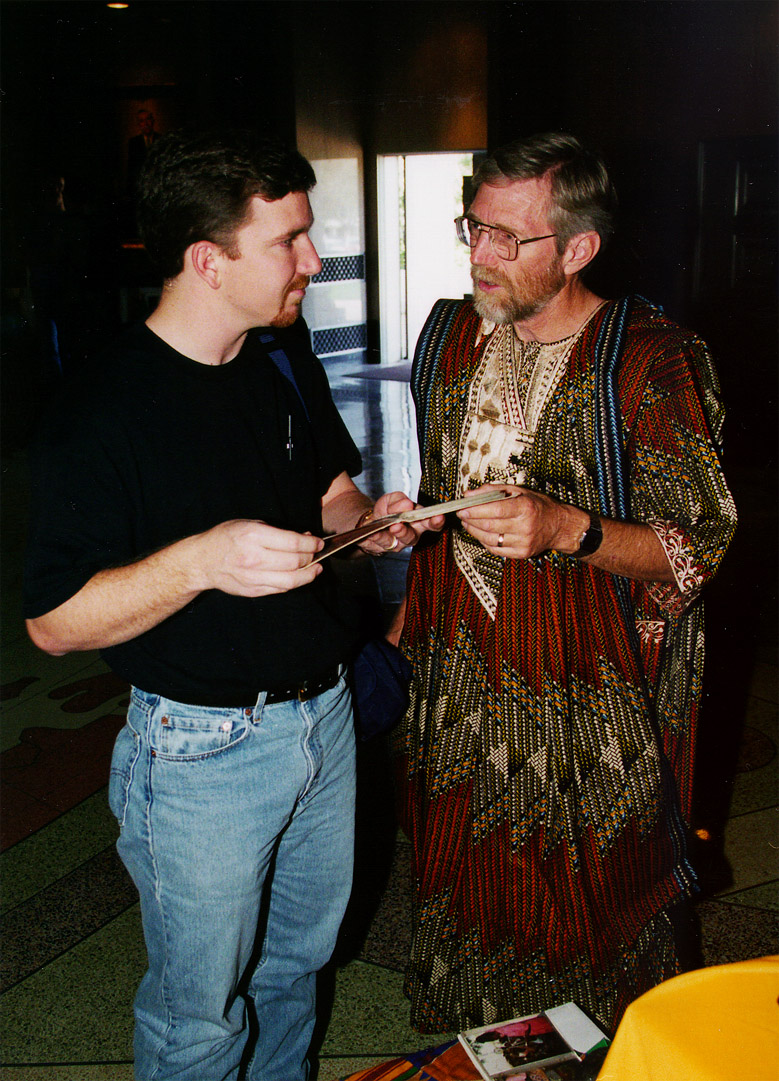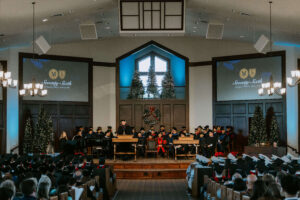
FORT WORTH, Texas (BP)–While the March 28 tornadoes in Fort Worth missed Southwestern Baptist Theological Seminary by a few miles, the sweeping message that all Christians are called to take the gospel to the nations made a direct hit on campus during Global Missions Week March 27 through 31.
“You are probably very much aware in the last year of the devastating landslides and floods in Middle America and cyclones in Bangladesh and earthquakes in Istanbul and Taiwan,” said Jerry Rankin, president of the Southern Baptist International Mission Board, at a breakfast meeting with faculty March 29 at the Texas seminary.
“One of our objectives for being here is to give the campus exposure to what the mission field is really like,” he continued, “but we did not bring the tornadoes!”
Rankin and other IMB personnel did, however, bring a challenging message communicated through chapel sermons, in-class presentations, seminars, one-on-one meetings and a missions marketplace, which included exhibits from various regions of the world.
“God is moving. He is crumbling walls and opening doors,” Rankin told students during a March 30 chapel service, referring to his recent visit to Cambodia.
Rankin noted that first-century Christians understood they were called by God to be a royal priesthood with the responsibility of proclaiming the gospel to the world.
“It is not only about us and our special relationship with God,” he continued. “Why, then, do only about 5 percent of the students gathered here feel the responsibility to share with the nations?”
While the Southern Baptist mission force will likely reach 5,000 this year after 7 years of record growth, there will still be only one Southern Baptist for every 2.8 million people and there are 1.67 billion people who have not heard the name “Jesus.”
But knowing the need is not enough, Rankin said. “The Great Commission is sufficient authority to send us to the lost, but it’s not enough to motivate us to go,” he said. “Our impulse comes from the indwelling presence of God. The only motivation that will send us is passion for God and broken-heartedness that God is being deprived of his glory.”
The IMB is urging all Christians to develop a passion to hear God praised and exalted by every people group of the world.
“To be consumed by the local is to miss God’s global purpose,” said Don Kammerdiener, IMB executive vice president, during a March 28 chapel sermon.
“Today world culture is coming together,” he said. “We think, ‘Surely my task starts where I live,’ but realize that where you live is already a place of global significance.”
If Christians feel guilty, Kammerdiener said, it should not be because they aren’t missionaries but because they aren’t involved in God’s global purpose. He challenged the students to stop drawing mental walls, noting that he drew such a wall around communist countries during his youth and was caught by surprise when communism fell. He had also said of war-torn Colombia, one place where he served, “That’s one place I’ll never go.”
“There is no sense of obligation to seek missionary appointment,” Kammerdiener said. “You let God determine that. But be desperately guilty if you eliminate places that [you believe] God will not touch.”
God is not only touching the world, but in the words of Habakkuk, is doing work “so amazing you would not understand it even if you were told,” said David Garrison, IMB vice president for strategy coordination and mobilization, during his March 29 chapel message.
The church planting movement erupting throughout the world today was once not part of Southern Baptists’ mental map, Garrison said. “Our vision was too small. We didn’t expect churches to grow so fast,” he said.
The IMB’s current emphasis is on reaching people groups. At least 12,000 distinct ones are identified today.
Lynn Kennedy is working among one, the Dagaari, in West Africa. “In the past it was normal for missionaries to be sent to a specific place and to stay there, doing their jobs in hopes that as people crossed their paths, they could witness,” she explained during a seminar March 30. “Just four or five years ago, Southern Baptists and other groups looked at what we had been doing — with countless missionaries and millions of hours of missionary labor we still have 1.67 billion who have never heard of Jesus Christ.”
The IMB and other organizations responded by changing methods, not the unchanging message of the gospel, Kennedy reminded. As a result, she continued, most IMB requests are now aimed at sending missionaries to unreached people groups.
“I work among animistic people who have never seen a light bulb and daily offer animal sacrifices to keep their dead ancestors and a plethora of gods happy,” said Kennedy, noting that most Americans find it difficult to believe that a third of the world’s population has never heard Christ’s name.
Today, after less than two years among the Dagaari, Kennedy reports a spiritual harvest well ahead of the schedule she had projected. She credits the spread of the gospel among the Dagaari to the extensive web of prayer support she set in place in the United States and around the world. She is also networking with other evangelical missionaries in her area.
Most recently Kennedy has lobbied for Campus Crusade to produce the “Jesus” film in the language of the illiterate Dagaari. A national Christian whom Kennedy is discipling will eventually take her place. “Dream big dreams,” she said. “Make plans that cannot possibly happen unless God shows up.”
The IMB is also reporting a spiritual harvest as administrators travel the world “mending fences” and strengthening IMB partnership with national Baptist conventions on nearly every continent. A recent meeting with Latin American leaders “started at a point where we hoped we would be when we ended the conference,” Rankin said.
The Latin leaders’ only point of discussion with Southern Baptists: how to break into spiritual darkness, Rankin said.
“National missionaries in South America will soon surpass our total number of Southern Baptist missionaries,” reported Avery Willis, IMB senior vice president of overseas operation, at an appointment service held March 31 at Travis Avenue Baptist Church in Fort Worth.
“God is giving them a heart for the nations,” he added.
Missionaries in Western Europe are reporting that God is saving people and calling them to lead simultaneously, Garrison said earlier in the week.
“One missionary from the area told me, ‘We didn’t start it, and we couldn’t stop it if we tried,'” he said.
While 51 percent of the Southern Baptist missionary force has passed through the halls of Southwestern, Rankin admitted it is a challenge to maintain that involvement. He shared that the IMB’s goal for visiting the seminary, however, is not to mobilize and enlist students to go as missionaries.
“We trust that in God’s providence that will happen, but that is not our objective,” he said.
Realizing that Southwestern will graduate thousands who enter pastorates or serve on church staff and other ministries, Rankin said, “How tragic if they should go into those God-called, confirmed places of service without a heart for missions and reaching the whole world.”
Rankin encouraged Southwestern to adopt WIGTAKE (Whatever It’s Going to Take), a philosophy circulating among IMB mission workers.
“No longer focus on just maintaining traditional strategies, programs and institutions,” he said. “Start instead with the end vision of ‘whatever it takes’ for all peoples of the world to come into relationship with our Lord. Then he will receive their praise and be glorified.”















